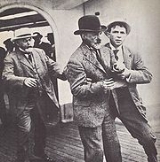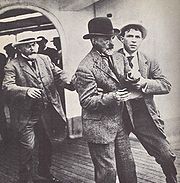
Charles Chapin
Encyclopedia
Charles Chapin was a New York
newspaper editor. He was convicted of the murder of his wife and sentenced to a 20-year-to-life term in Sing Sing
prison.
Chapin was born in upstate Watertown, New York and began his career on a Kansas
newspaper, aged 14, moving later to Chicago
to work for the Tribune
, where he gained renown as a crime reporter. There he excelled sufficiently to be hired, in 1898, by the World
, a New York daily, run by the Pulitzer family, which enjoyed one of the largest circulations in the country.
Chapin became editor of the evening edition of the World and was renowned as a hard taskmaster. He is said to have fired a total of 108 journalists during his tenure - one of them for daring to use the new-fangled word "questionnaire". Among his victims was his own publisher's son.
Opinions of Chapin differed. To many newspapermen he was "the greatest city editor who ever lived". Those who worked for him, however, often hated him; when Irvin S. Cobb, a World reporter, heard that his editor was sick, he is said to have looked up from his work and remarked, "I hope it’s nothing trivial." According to Andy Logan, a noted correspondent to The New Yorker
, Chapin was "terrible tempered" and in the opinion of many of his staff had "a legendary imperviousness to human suffering, especially theirs."
 One of Chapin's most celebrated coups was the publication of a photograph captured by an Evening World photographer showing the moment when New York mayor William Jay Gaynor
One of Chapin's most celebrated coups was the publication of a photograph captured by an Evening World photographer showing the moment when New York mayor William Jay Gaynor
was shot by a would-be assassin. William Warnecke, the photographer, who had been lining up a portrait of the mayor, snapped the shutter just as Gaynor crumpled to the ground; Chapin's response, when the developed photo arrived on his desk, was: "Blood all over him! And exclusive, too!"
Chapin's career in New York newspapers came to an end in September 1918 when, dogged by illness and debt, and concerned for his increasingly fragile wife of 38 years, he shot and killed his spouse while she was sleeping. News of the shooting shocked many of the newsman's colleagues. "They had known he would be involved in a murder some day," Logan writes, "but had always assumed he would be the victim."
Although he had apparently intended to commit suicide himself following the murder, the famous editor was instead arrested, convicted of the shooting, and sent to Sing Sing prison for a term of 20 years to life. There he wrote a memoir and became renowned for the rose garden he cultivated in the grounds, acquiring the nickname of "The Rose Man."
Chapin edited the prison newspaper at Sing Sing for a short time. He died there on December 13, 1930.
New York City
New York is the most populous city in the United States and the center of the New York Metropolitan Area, one of the most populous metropolitan areas in the world. New York exerts a significant impact upon global commerce, finance, media, art, fashion, research, technology, education, and...
newspaper editor. He was convicted of the murder of his wife and sentenced to a 20-year-to-life term in Sing Sing
Sing Sing
Sing Sing Correctional Facility is a maximum security prison operated by the New York State Department of Correctional Services in the town of Ossining, New York...
prison.
Chapin was born in upstate Watertown, New York and began his career on a Kansas
Kansas
Kansas is a US state located in the Midwestern United States. It is named after the Kansas River which flows through it, which in turn was named after the Kansa Native American tribe, which inhabited the area. The tribe's name is often said to mean "people of the wind" or "people of the south...
newspaper, aged 14, moving later to Chicago
Chicago
Chicago is the largest city in the US state of Illinois. With nearly 2.7 million residents, it is the most populous city in the Midwestern United States and the third most populous in the US, after New York City and Los Angeles...
to work for the Tribune
Chicago Tribune
The Chicago Tribune is a major daily newspaper based in Chicago, Illinois, and the flagship publication of the Tribune Company. Formerly self-styled as the "World's Greatest Newspaper" , it remains the most read daily newspaper of the Chicago metropolitan area and the Great Lakes region and is...
, where he gained renown as a crime reporter. There he excelled sufficiently to be hired, in 1898, by the World
New York World
The New York World was a newspaper published in New York City from 1860 until 1931. The paper played a major role in the history of American newspapers...
, a New York daily, run by the Pulitzer family, which enjoyed one of the largest circulations in the country.
Chapin became editor of the evening edition of the World and was renowned as a hard taskmaster. He is said to have fired a total of 108 journalists during his tenure - one of them for daring to use the new-fangled word "questionnaire". Among his victims was his own publisher's son.
Opinions of Chapin differed. To many newspapermen he was "the greatest city editor who ever lived". Those who worked for him, however, often hated him; when Irvin S. Cobb, a World reporter, heard that his editor was sick, he is said to have looked up from his work and remarked, "I hope it’s nothing trivial." According to Andy Logan, a noted correspondent to The New Yorker
The New Yorker
The New Yorker is an American magazine of reportage, commentary, criticism, essays, fiction, satire, cartoons and poetry published by Condé Nast...
, Chapin was "terrible tempered" and in the opinion of many of his staff had "a legendary imperviousness to human suffering, especially theirs."

William Jay Gaynor
William Jay Gaynor was an American politician from New York City, associated with the Tammany Hall political machine. He served as mayor of the City of New York from 1910 to 1913, as well as stints as a New York Supreme Court Justice from 1893 to 1909.-Early life:Gaynor was born in Oriskany, New...
was shot by a would-be assassin. William Warnecke, the photographer, who had been lining up a portrait of the mayor, snapped the shutter just as Gaynor crumpled to the ground; Chapin's response, when the developed photo arrived on his desk, was: "Blood all over him! And exclusive, too!"
Chapin's career in New York newspapers came to an end in September 1918 when, dogged by illness and debt, and concerned for his increasingly fragile wife of 38 years, he shot and killed his spouse while she was sleeping. News of the shooting shocked many of the newsman's colleagues. "They had known he would be involved in a murder some day," Logan writes, "but had always assumed he would be the victim."
Although he had apparently intended to commit suicide himself following the murder, the famous editor was instead arrested, convicted of the shooting, and sent to Sing Sing prison for a term of 20 years to life. There he wrote a memoir and became renowned for the rose garden he cultivated in the grounds, acquiring the nickname of "The Rose Man."
Chapin edited the prison newspaper at Sing Sing for a short time. He died there on December 13, 1930.
External links
- The Rose Man at www.correctionhistory.org Correctionhistory.com article on Chapin's relationship with Sing Sing warden Lewis LawesLewis LawesLewis Edward Lawes was a prison warden and an outspoken proponent of prison reform.-Biography:He was born on September 13, 1883, the only child of Henry Lewis and Sarah Abbott...
- http://www.jamesmcgrathmorris.com/excerpt.htm Text of the first chapter of McGrath's Chapin biography
- AmericanHeritage.com / CHARLES CHAPIN at www.americanheritage.com Biography of Chapin from American Heritage

